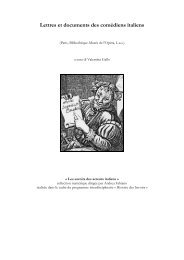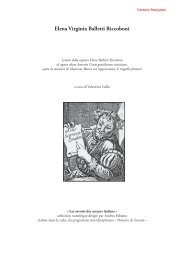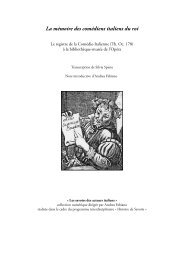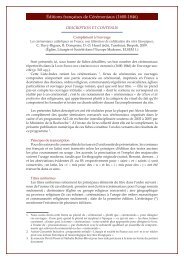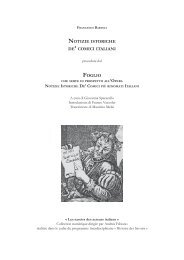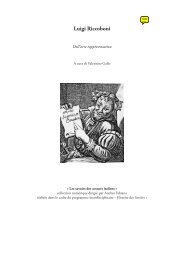Luigi Riccoboni, Il liberale per forza / L'italiano ... - irpmf - CNRS
Luigi Riccoboni, Il liberale per forza / L'italiano ... - irpmf - CNRS
Luigi Riccoboni, Il liberale per forza / L'italiano ... - irpmf - CNRS
You also want an ePaper? Increase the reach of your titles
YUMPU automatically turns print PDFs into web optimized ePapers that Google loves.
16 – Valentina Gallo<br />
Prefaccio/Preface<br />
Nell’edizione 1729 il Prefaccio/Preface occupa le pp. LXXX-CXV del primo tomo, ed è introdotto,<br />
a p. LXXIX, dal titolo Préface generale du Nouveau théâtre italien de Mr. Lelio. Imprimée ci-devant à la<br />
tête du Liberal malgré lui.<br />
Prefaccio: [1] sempre di > sempreidi; [2] dillettare > dilettare; proffonda > profonda; Molieres e tant’altri ><br />
Mollieres, etant, altri; eccellenti > excellenti; [4] douevo > dovevo; [6] rapitori sfortunati ><br />
rapitoris fortunati; [8] che abbino > che habbino; [9] Pourcegnac > Pourceaugnac; autori, e<br />
che > autori, o che; dal Boccaccio > da Boccaccio; [10] poiché > poi che; al improviso > ad improviso;<br />
paragonate à > paragonate â; [11] disaprovazione > difaprovazione; [12] e non posso > o non<br />
posse; al età > all età; [13] se cercarò > se cercaerò; [14] quel fi ne > qual fi ne; [16] attenzione ><br />
attentione; [18] assogettisse > assogettisce; [19] tal sorte > tal orte; bene spesso > bene pesso;<br />
[20] indispensabilmente > indi spensabilmente; [21] sfuggito > sfugito; [22] sarò sempre> sarò<br />
sem<strong>per</strong>; rischio > riscio; [25] nazione > natione; dell’universale > delle universale; di Aristotile ><br />
d’Aristotile; [26] al opposto > al oposto; [27] tutta la poetica > tutta la poëtica; <strong>per</strong>sonna ><br />
<strong>per</strong>sona; [28] uomo > vomo; proffessione > professione; [29] immitar > imitar; [30] essermi ><br />
esermi; mostruosa > monstruosa; [31] genij > genii; noi > no i; massime si > massime fi ; [32] <strong>per</strong><br />
compiacere > <strong>per</strong>compiacere; distesso in > distessoin; in forma de’ > in forma che; [33] Se dovesse ><br />
Se douessi; [34] spiccare > spicare; ne’ > né.<br />
Preface: [1] toujours > toûjours; [2] sur-tout > surtout; les autres (lors, > les autres: Lors,; une comedie<br />
italiene > une comedie italienne; représentoient > representoient; parfaitement ce > parfaitement le;<br />
si-bien > si bien; [5] représentation > representation; [6] je m’étois > je m’etois; fus contrains ><br />
fus contraint; bienseance > bienséance; [7] représentations > representations; [11] de tous côtez ><br />
de tous côtés; non-seulement > non seulement; [12] donc prêts > donc prêt; [16] jouons > joüons;<br />
[18] remarques > remarqnes; [19] parallele > paralelle; [21] à plu > à plû; [22] de jouer > de<br />
joüer; inconnue > inconnuë; [23] loue > loüe; représentation > representation; sovvenir > souvenir;<br />
représentez > representez; [24] louer > loüer; agreable > agréable; [26] louer > loüer; [27]<br />
attachez > attachéz; [28] connues > connües; [29] guere > gueres; [30] saillies > sailllies; [31]<br />
représentation > representation; [34] non seulement > non-seulement; au dessus > au-dessus; [35]<br />
représente > represente; [36] tout à fait > tout-à-fait; [41] tout à fait > tout-à-fait; [45] toujours ><br />
toûjours; [48] tout à fait > tout-à-fait; monstrueuse malgré > monstrueusemalgré; [53] tout à fait ><br />
tout-à-fait; [54] agreable > agréables; [56] toujours > toûjours;<br />
Avis sur la traduction: [1] l’on n’auroit > l’on auroit; [2] agreable > agréable;<br />
Liberale/Liberal: il canovaccio apre nell’edizione del 1729 il secondo volume (pp. 1-78):<br />
Liberale: I, 1: fattassi > fatassi; I, 2: aiutarlo > aiuitarlo; chamato > chiamato; loriceverà > lo riceverà;<br />
gli dice > gli dsce; si trattengono > si trattenghino; I, 3: entra > extra; I, 4: si dice ancora > si<br />
dice ancore; di merito > dimerito; istudiare > istudiar; I, 6: qualched’uno > qualched’unoi; I, 7:<br />
esebizioni > ese bizioni; I, 9: un cavaliere arivato > un cavaliere arrivato; I, 10: segli accosta ><br />
se gli accosta; Pantalone lo ringrazia > Pantalone ls ringrazia; su la porta, che > su la porta ‘<br />
che; certissime > eertissime; che uon vorrebbe > che non vorrebbe; I, 11: quei contorni vol > quei<br />
contorni vuol; glielo mostra > gliele monstra; gli elo dipinge > glielo dipinge; gli mostra > gli monstra;<br />
gli elo impedisce > glielo impedisce; lo vol condure > lo vuol condure; loda la magnifi cenza > loda<br />
magnifi cenza; apresso > appresso; I, 12: sin > fi n; II, 1: dicendo che lo vogliono > dicendo che<br />
lo vogliano; secondare > secundare; risolverà > resolverà; moglie > mogl e; II, 2: gli ele > gliele;<br />
proponne > propone; di andare a godere > de andare a godere; <strong>per</strong> la mano partano > <strong>per</strong> la<br />
mano partono; II, 4: abito > habito; II, 5: raccontarà > racconterà; II, 6: si sono uniti > fi sono<br />
uniti; II, 7: in quella almeno > in questa almeno; II, 8: e <strong>per</strong>ò > e <strong>per</strong>ciò; III, 2: tutti > tvtti;<br />
III, 3: turca > turcha; III, 4: entrano > antrano; III, 5: Viene Pantalone > Vienne Pantalone;<br />
© IRPMF, 2008 – Les savoirs des acteurs italiens, collection dirigée par Andrea Fabiano



